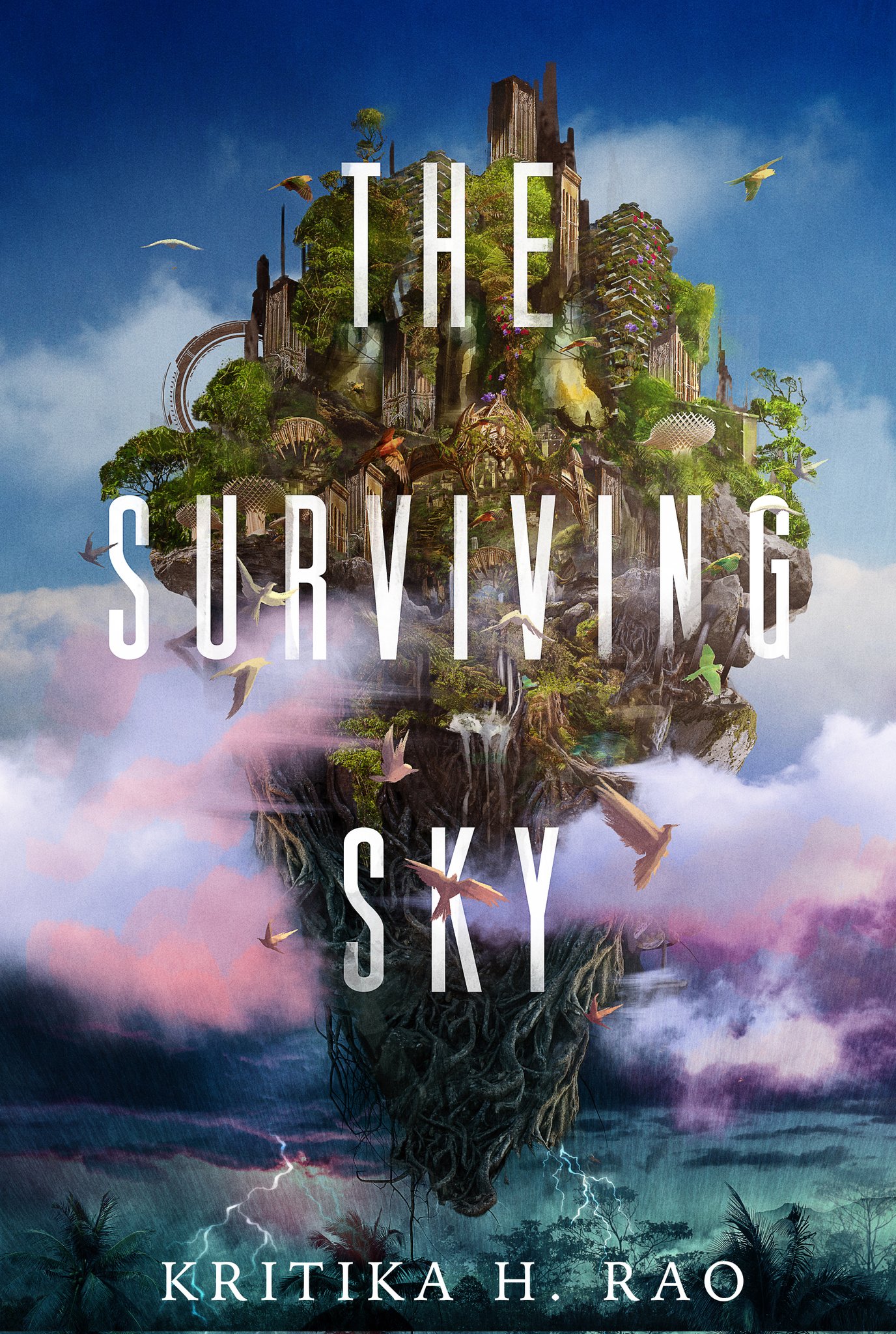
Genres: Fantasy, High Fantasy, Queer Protagonists, Science Fantasy
Representation: Desi-coded setting and cast, bisexual MCs, secondary F/F, queernorm world
PoV: Third-person, past tense; dual PoVs
Published on: 13th June 2023
ISBN: B0B6ZJT7R1
Goodreads

This Hindu philosophy-inspired debut science fantasy follows a husband and wife racing to save their living city—and their troubled marriage—high above a jungle world besieged by cataclysmic storms.
High above a jungle-planet float the last refuges of humanity—plant-made civilizations held together by tradition, technology, and arcane science. In these living cities, architects are revered above anyone else. If not for their ability to psychically manipulate the architecture, the cities would plunge into the devastating earthrage storms below.
Charismatic, powerful, mystical, Iravan is one such architect. In his city, his word is nearly law. His abilities are his identity, but to Ahilya, his wife, they are a way for survival to be reliant on the privileged few. Like most others, she cannot manipulate the plants. And she desperately seeks change.
Their marriage is already thorny—then Iravan is accused of pushing his abilities to forbidden limits. He needs Ahilya to help clear his name; she needs him to tip the balance of rule in their society. As their paths become increasingly intertwined, deadly truths emerge, challenging everything each of them believes. And as the earthrages become longer, and their floating city begins to plummet, Iravan and Ahilya's discoveries might destroy their marriage, their culture, and their entire civilization.
I received this book for free from the publisher via NetGalley in exchange for an honest review. This does not affect my opinion of the book or the content of my review.
Highlights
~Flying plant cities!
~which don’t have marriage counselling, I guess
~Desi solarpunk
~women single-handedly inventing archaeology
~a marriage as a microcosm of a world
~the most mindblowing of epic reveals
The Surviving Sky is a massively impressive debut with an underlying design drawn from Hindu philosophy. (Not mythology. Philosophy. The distinction is important.) Aside from one or two minor details – like the rudra beads worn by citizens, which in many ways mimic the Kimoyo beads of Wakanda in the Marvel comics – everything in this book was new to me. Rao has built a world like nothing I’ve ever seen before, down to its smallest parts, and listen, I read a lot. I read SFF a lot. It is not very often that I come across something in a SFF book that is not even a little bit like something I’ve encountered elsewhere. I’m not trying to toot my own horn here, but I really want to drive home how incredibly unique Rao’s creation is. Even if it turns out that what is wholly new to me is very familiar to Hindu readers – I doubt that’s the case, but I don’t know nearly enough about Hinduism and the culture around it to be sure – it doesn’t change the fact that the majority of the English-reading community is going to be left absolutely floored by what is completely new to us.
I mean. When I finished reading Surviving Sky, I had to go and lie down. And then spend about four hours breaking down everything Rao had unleashed upon me, a poor helpless reader, in a vain attempt to process it all.
Initially I was actually very disappointed with this book – I was hoping for really lush, descriptive prose to match the beautiful setting, and Rao’s writing struck me as almost blunt; not what I was looking for at all. I came pretty close to DNFing it. But I’m so glad I pushed through the first few chapters, because it didn’t take long before I was swept up in Iravan and Ahilya’s complicated relationship (and relationship drama), and after that, the pages just flew by. I felt like a very frantic roadrunner, reading as quickly as I could, enthralled but also desperate to find out what would happen next, and next, and next.
And LAST. Because – oh my gods, that ending-reveal. That was a climax of mythic proportions and no, I am still not over it.
The Surviving Sky is two stories intwined: the end (or is it?) of a marriage, and the potential end of an era for the flying plant cities that are the last bastions of humanity (the surface of the Earth being constantly ravaged by devastating storms known as earth-rages). Not that it’s immediately obvious that the cities are in trouble, but from the opening pages we learn that the plant-magic – trajection – that keeps the cities functioning (and flying) is becoming harder and harder…even if the ruling bodies don’t want to believe that. And while at first it seems like Ahilya and Iravan are a couple who just happen to be born into this time, it eventually becomes clear that their relationship and the gradual failing of the cities are connected, in ways I guarantee you will not see coming.
Rao’s prose is surprisingly addictive; easy to read and fast-paced, despite managing to allow for a fair bit of (very necessary and plot-relevant) introspection. I say ‘surprisingly’ because, as mentioned above, I was hoping for a different kind of writing style, and Rao’s is a fair bit plainer and more direct than I generally enjoy. I’m not sure I can put into words why it worked for me, when similar styles from other storytellers have resulted in DNFs. Part of it is probably how…charismatic Ahilya and Iravan both are; they’re both characters that you can imagine dominating any room they walk into, powerful personalities that you can’t help but gravitate towards, irregardless of whether or not you actually like them. And I really did not like Iravan as a person at all – more on that in a minute – but he makes for an incredibly compelling character, just as Ahilya does. It’s not that the secondary cast is not so developed, but they feel less developed next to these two; every other character pales in comparison to these leads, seem faded and inconsequential even when they are, in fact, incredibly important to the city and/or plot. And that feels deliberate, and correct, because when push comes to shove this is Ahilya and Iravan’s story more than it is anyone else’s; not just because they happen to be the main characters, but because of who they are, what they are, the effect they have on those around them, on the city, on history. They are their world in miniature; the fate of their civilisation is played out in their interactions, their antagonism, their partnership.
It’s an incredible thing to witness; even more so when you recognise what it is you’re seeing. It’s masterful.
(I’ve done a lot of thinking about Surviving Sky since I finished it. Can you tell?)
The Marriage
I feel like I’m probably supposed to say that how well you ‘buy into’ Surviving Sky is dependant on how much you buy into Ahilya and Iravan’s marriage – but the thing is, that’s not true. I wasn’t rooting for them; I was screaming at Ahilya to divorce her utter dickhead of a husband for most of the book – and it didn’t matter. It in no way affected how deeply invested I was; it didn’t make it any easier to tear my eyes away; it didn’t jolt me out of the story or give me my breath back. These two are just that compelling, that even when I thought they needed to get the fuck away from each other, I couldn’t stop turning pages. I don’t think I’ve ever seen characters with this kind of charisma; I often see characters described as charismatic, but Rao is the first author I’ve come across to successfully write characters who are like gravity wells; characters I can’t disengage from even if I despise them.
It was certainly an experience.
And I mean: if I stop and think about it, then for the most part, Ahilya and Iravan’s relationship makes very little sense to me. Almost at once, I thought they ought to divorce; on an objective level, I feel like Ahilya’s love for Iravan, in particular, is inexplicable – and both the narrative and Iravan himself come to acknowledge that most of the issues in the marriage are of Iravan’s doing or making. Ahilya is far from perfect, but when she starts a fight, it’s because she has an incomplete picture of the truth – because either Iravan or their government have withheld or outright lied to her. Whereas Iravan is arrogant, withdrawn, cold, domineering – for crying out loud, when Surviving Sky opens, he hasn’t talked to Ahilya for seven months, while he was off sulking in his office! Why? Ahilya doesn’t want to have a baby with him, given the rocky shape of their marriage right now.
IRAVAN.
IRAVAN.
HI.
YOU’RE KIND OF A MASSIVE CHEESERIND.
Iravan is an interesting character to read about. But as a person, he’s an asshole, and even if some of his asshattery has understandable roots – even if, by the end of Surviving Sky, we know exactly what is so deeply, fundamentally wrong with him – that doesn’t really change the fact that I unequivocally sided with Ahilya and thought she deserved so much better. Iravan has a real problem with empathy (in that he has little) and arrogance (of which he has a lot). At one point in the book, he (accidentally) almost kills her and her friend, and that should have been it. Done. The ultimate dealbreaker.
But it wasn’t. And now that the book is over, that bothers me a lot – it bothers me that Ahilya wasn’t even mad about it; that she instead ran after Iravan to make sure he was okay (the one and only time she doesn’t call him out on his bs and confront him with it); that it is never mentioned or referred to again. If I’d been Rao’s editor, I’d have asked her to either remove or massively change that scene, because it tips the scales too far; everything that Iravan does up to that point can be fixed with open and caring communication, but that? No. That’s too much. Or it should be. But instead, it’s disturbingly easy to go along with it; to forget That Scene ever happened. Which is necessary: if we acknowledge That Scene, then nothing after it makes sense; the story (or at least Iravan and Ahilya’s marriage) should have ended there. But Rao’s writing is so mesmerising that it pulls you along even when you should really want to get off the ride!
I mean this as a compliment. I mean, I genuinely think That Scene was a bad call from a storytelling perspective; but the fact that Rao could convince me to forget about it – could in fact bring me around to becoming extremely invested, by the end of the book, in Ahilya and Iravan getting back together and making things work – is Exhibit A in how impossibly compulsive The Surviving Sky is.
Beyond the Marriage
Outside of Ahilya and Iravan’s marriage are several majorly important plotlines and threads. Trajection – which keeps humanity alive – is becoming harder, and Iravan, as an extremely important and skilled architect (which in this world means, someone who can use trajection) is becoming convinced that there is some Thing, maybe a conscious, living thing, inside the realm of trajection that is interfering with it. Humanity desperately needs more architects than it has, putting pressure on both the architects and the sungineers – think solarpunk engineers – to come up with an innovative solution. Ahilya’s friend is frantically trying to build a battery that would take some of the strain off the architects, and Ahilya is helping by smuggling very illegal plants into the city from her trips to the surface. At the same time, Iravan is being accused of losing control of his powers, a situation which worsens when the Council realise how badly his relationship with Ahilya has broken down. (‘Material bonds’, aka marriage and specifically parenthood, being mandatory for architects.)
To a(n initially) lesser degree, there is also the mystery of what causes the earth-rages that makes the planet’s surface uninhabitable – and Ahilya’s passionate drive to prove that non-architects are not second-class citizens; to trigger a shift in the public perception of architects being the only people who really matter. The architects claim that there is no way for humanity to survive without trajection; Ahilya is searching for proof that the yakshas – giant animals that mysteriously manage to exist down on the surface – have some adaptation or access to safe habitats that humans could utilise as well. The callous dismissal of her theories, and her search for alternate answers to those the architects provide, is written well-enough to make your blood boil; even as Rao also has you grudgingly admitting that you can see where the architects are coming from.
The situation is far from ideal, but there will be no easy fix. In that way, Rao has created a world that is as messy and complicated as ours, without simple answers, populated by characters as contradictory and multi-faceted as those of us writ in blood instead of ink.
I can’t do anything but applaud.
Mind: BLOWN!
I could probably write a full-on thesis on Rao’s incredible worldbuilding, which as I said, is so unique and interesting. It’s Desi solarpunk! But I think it’s going to be much more fun for the reader to discover the whole of it themselves, so I won’t go into much detail.
What I want to do is talk – a little bit, as vaguely as possible, without spoilers – about THAT ENDING.
Because look: as a general rule of thumb, reveals that the reader could never have guessed at annoy me. I never see it coming, but I love when I can look back and, in hindsight, see all the clues I didn’t put together. And that is not the case here. The reveal, when it comes, is a lot more telling than showing, and although the groundwork for tiny bits and pieces of it were laid down, most of it comes kind of out of nowhere.
And I don’t care.
It is AMAZING.
I don’t see how Rao could have pulled off this reveal without doing a lot of telling – and of course, telling-not-showing isn’t inherently bad anyway, only bad when it’s badly done. And although there’s a fair bit of it, I wouldn’t say Rao’s done it badly.
But honestly, even if she had, the sheer breathtaking SCOPE of that reveal would have negated any complaints from me. It’s not that Surviving Sky does a sudden 180; it’s not that what’s revealed contradicts established worldbuilding (I mean, it does, but it’s more ‘we didn’t know this’ rather than ‘we believed the exact opposite of this and are now being proved wrong’); it’s not that Rao rips the rug out from underneath us. It’s…it’s just so HUGE. We are talking literally mythic proportions; a zooming-out, a Big Picture revealed, that I could never have imagined, on a scale that the mortal mind can barely comprehend. It’s gorgeous and unprecedented by anything I’ve ever encountered; it makes it clear that the story hasn’t even started yet, that it’s the forces of the very universe that are going to be friends and foes and battlegrounds going forward.
No quibble I had with Surviving Sky survived the climax. All flaws and faults are forgiven and forgotten. I cannot emphasise this enough: if the premise interests you? Then read this book to the end. Don’t DNF it. You need to experience that – that – that APEX FINALE.
Okay?
All right then.
The Surviving Sky is out next Tuesday. Prepare for your very own galaxy-brain moment.







Leave a Reply